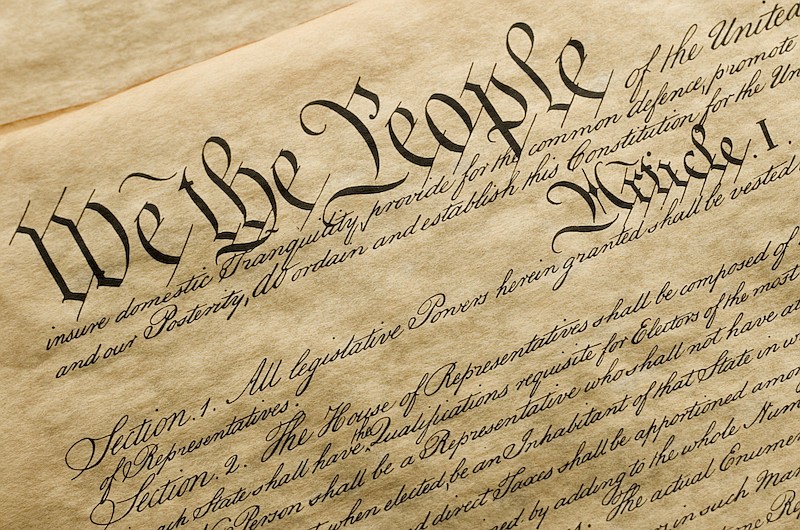POINT: Founding document isn't perfect but should be preserved
By Jeffrey Sikkenga
March 16 was the birthday of a little man who made a huge impact on America. At 5-foot-4 and not much over 100 pounds, James Madison - our fourth president (1809-1817) - was the smallest of America's founders. But he was a constitutional giant.
Madison didn't write the Constitution single-handedly; it was the product of argument and compromise among those who attended the 1787 Constitutional Convention in Philadelphia. But of all the Founders, Madison was most responsible not only for the Constitution itself but also for the Bill of Rights that followed. That's why he is fairly called "The Father of the Constitution."
These days, however, Madison's progeny is under attack. Critics denounce the Constitution as anti-democratic, pro-slavery, outdated and in desperate need of amendments on many issues, such as the Electoral College.
None of these criticisms would surprise Madison; he heard them in his own day. In response to anti-Federalists who argued in 1787 that the Constitution did not create a democracy, Madison reminded them in The Federalist No. 10 that the goal was to establish a constitutional republic in which the people govern through the deliberation of representatives and the rule of law, not through instant public opinion, passion or the mob.
In response to those who claimed the Constitution was pro-slavery, Madison argued in The Federalist No. 42 that critics should not "pervert" the text into saying something it doesn't. The words of the Constitution were a compromise on slavery that nevertheless "ought to be considered as a great point in favor of humanity" because they left open the eventual abolition of the "unnatural traffic" of slave trade and "the illicit practice" of slavery itself. Madison's argument was later taken up by opponents of slavery, including Abraham Lincoln and the great Black abolitionist Frederick Douglass.
In defending the Constitution, Madison knew it wasn't perfect. That's one reason he offered what are now the first 10 amendments: the Bill of Rights. It's also the reason we have important amendments like those abolishing slavery and extending the right to vote. The Constitution can be improved.
But before we replace or radically alter Madison's Constitution, we need to remember how fortunate we are. It's hard to have and keep a constitution that promotes stable government, protects individual freedom and secures the rule of law. Lots of other countries have tried and failed.
To preserve what is good in the Constitution, Madison knew, as he said in The Federalist No. 49, that the document must continue to have "that veneration without which the wisest and freest governments would not possess the requisite stability." In other words, the key to the Constitution's continuing success is not just its words, but the effect those words have on the hearts and minds of the American people.
"We the People" need to be a constitutional people who understand why the Constitution says what it says. If we don't, as Madison understood, our experiment in self-government will fail and we will lose the "Blessings of Liberty" the Constitution proclaims.
Sadly, survey after survey shows that too many Americans, especially younger Americans, have neither the knowledge of, nor the devotion to the Constitution that Madison called for. It's a serious crisis.
The only way to remedy this is by studying the words and principles of the Constitution itself. Before jumping on the bandwagon of those who claim the Constitution is hopelessly outdated, we need to read and understand what the Declaration of Independence and Constitution actually say. We need to relive the great debates over the Constitution and our Founding principles so we understand who we are as a people - and what it means to be an American. And when we consider any change to the Constitution, it should always be a change that brings the document more - not less - in line with our Founding principles of individual liberty, personal responsibility and limited government.
Every year, crowds of Americans visit national monuments to George Washington, Thomas Jefferson, Abraham Lincoln and Martin Luther King Jr. And rightfully so. But there is no such monument to James Madison.
His monument is the Constitution. The better you know it, the more inclined you will be to preserve it.
Jeffrey Sikkenga is executive director of the Ashbrook Center at Ashland University in Ohio, an independent educational center specializing in U.S. history and government. He wrote this for InsideSources.com.
Tribune Content Agency
COUNTERPOINT: If we don't expand our democracy now, we'll lose it
By Peter Certo
Thomas Jefferson wrote once that "government is the strongest of which every man feels himself a part."
It's a noble idea, calling back to the Constitution's dedication to "we, the people." Few Americans today are constitutional scholars, but most know at least those words. They sum up the democratic sentiments that many of us cherish.
But the truth is, few today would find anything democratic about the government the Constitution gave us. Slavery was widely practiced. Women couldn't vote, nor could men who didn't own property. By one estimate, just 6% of the population could vote in 1789.
If we cherish the Constitution as a democratic document today, it's because of its hard-won amendments - protecting freedom of speech and press, ending slavery and enfranchising African Americans after the Civil War, allowing women to vote barely a century ago - along with expansions of voting rights, like during the civil rights era of the 1960s.
Ours is a long history of movements struggling to make government actually resemble the democracy proclaimed in our founding documents. We've achieved so much, but these shortcomings also produced unspeakable suffering - from slavery to the Civil War to long years of violence and segregation.
To that list we might also add much of the suffering in more recent years.
The Electoral College system, which elects presidents by a convoluted process favoring smaller, more conservative states, allowed both Donald Trump and George W. Bush to win the White House despite losing the popular vote. The consequences include everything from the Iraq War under Bush to the disastrous U.S. response to the COVID-19 pandemic under Trump.
It's increasingly difficult for voters to repudiate leaders for failures like these. Despite losing the popular vote by nearly 7 million in 2020 - more than twice his popular vote defeat in 2016 - President Trump came within just 40,000 votes in three states of being re-elected by the Electoral College.
The same system badly warps the Senate. Republican senators haven't represented more Americans or won more votes than Democrats in well over two decades, yet they've controlled the body for most of that time.
During the worst of the pandemic, the GOP-led Senate repeatedly refused more generous relief measures that might have eased pandemic suffering. Over the years they also shot down immensely popular legislation on gun control, immigration reform and environmental protection.
Even now, in a 50-50 Senate, Democrats are extremely constrained by the fact that Republicans representing 40 million fewer Americans can outvote them.
Ominously, these same systems are enabling the worst attacks on voting rights since Jim Crow. According to the Brennan Center, as of March, Republicans had introduced an astounding 253 bills in 43 states to restrict voting rights and limit democracy.
These bills do everything from eliminating mail-in voting to letting lawmakers override popular vote decisions - interventions that could be decisive in the Electoral College and Senate, which already require Democrats to win overwhelming majorities just to eke out victories.
Combined with a fresh round of Republican gerrymandering in the House - drawing voting districts designed to minimize representation from the opposite party - Republicans could easily block the Biden administration's agenda and then win the House, Senate and White House with a minority of votes.
This is not a government of "we, the people." So it's time to amend the Constitution again - to replace the Electoral College with a national popular vote, make our Senate more small "d" democratic, end the use of partisan gerrymandering, and protect the right to vote.
But amendments are unlikely, since they'd require votes from the same politicians now gaming the system.
Another option for Democrats would be to simply end the Senate filibuster, pass the For the People Act to protect voting rights and end gerrymandering, and admit new states to the union - like the District of Columbia and Puerto Rico - which could partly rebalance the Senate and Electoral College while enfranchising millions of American citizens.
Whatever the approach, if we don't expand our democracy now, we might lose it for generations to come.
James Madison, the lead drafter of the Constitution, once warned that "silent encroachments by those in power" were the biggest threat to freedom. If we want to protect our democracy, we can't be silent about those threats - including those buried in that very Constitution.
Peter Certo is the senior editorial manager of the Institute for Policy Studies. He wrote this for InsideSources.com.
Tribune Content Agency

